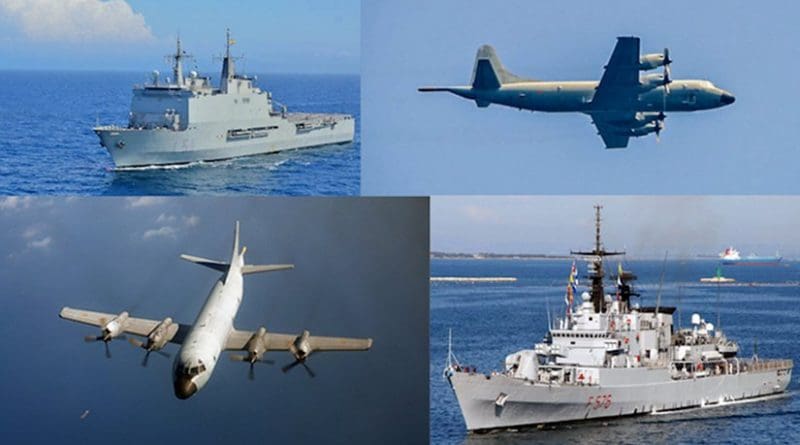UN And EU Urge Vigilance As Somali Pirates Return – Analysis
By IDN
By Jaya Ramachandran
With the Somali pirates back after a lull of five years, the United Nations and the European Union anti-piracy taskforce (EU Naval Force) are urging greater vigilance and asking ships to continue to follow the advice of navies and the International Maritime Organization (IMO) when planning passage off Somalia.
The UN Office on Drugs and Crime (UNODC) Executive Director Yury Fedotov said: “After . . . attacks, following a lull of five years, it is clear that Somali pirates are resurgent and intent on continuing attacks on commercial shipping. I urge the international community to be vigilant, to work in close partnership and to hold the Somali pirates accountable.” Fedotov was speaking after a spate of recent piracy attacks off Somalia.
According to analysts, there are several reasons for resurgence in piracy, including drought, famine, corruption, a surge of smuggled weapons and the influence of the Islamic State.
A Pakistan-owned cargo vessel, which was carrying food, was hijacked off the coast of central Somalia, Somali officials said on April 4, according to the New York Times. The hijacking came hours after the pirates hijacked an Indian vessel along the coast of Somalia near a village named El Hur.
Abdillahi Ahmed Ali, mayor of Somali town Hobyo, confirmed the incident while talking to Voice of America, but expressed unawareness about the number of crew members on the Pakistani vessel called Salama 1.
An Indian registered cargo dhow, which was hijacked by suspected Somali pirates on April 1, was meanwhile in the vicinity of Hobyo, the EU Naval Force said on April 3. “EU Naval Force can confirm that an Indian registered cargo dhow was seized by suspected pirates on 01 April and is now in the vicinity of Hobyo, Somalia,” a statement on its website said.
Commenting the recent attacks, the head of UNODC’s Nairobi-based Maritime Crime Programme Alan Cole said: “The threat of Somali piracy has never gone away: it has been suppressed by the good work of the shipping industry and their security teams, navies, and UNODC’s support to the trial and imprisonment of 1,300 pirates.”
Large parts of the Somali coast remain beyond the reach of law enforcement authorities so ships should continue to follow the advice of navies and the International Maritime Organisation when planning passage off Somalia. UNODC continues to support the trials of piracy suspects in the region and the Somali maritime law enforcement agencies as they extend their reach around the Somali coast.
UNODC’s Global Maritime Crime Programme works in South and South East Asia, West Africa and the Indian Ocean, and in five locations across Somalia. The programme addresses every aspect of maritime crime including terrorism, people trafficking, migrant smuggling, narcotics trafficking, fisheries crime, maritime hostage-taking and maritime piracy.
In the wake of the hijack of the Aris 13, off Puntland – a region in northeastern Somalia whose leaders declared the territory an autonomous state in 1998 – IMO Secretary-General Kitack Lim urged the shipping industry to apply diligently IMO guidance and best management practices to avert possible piracy attacks,
“While we have seen a very welcome decline in piracy off Somalia since the last reported hijack by Somali pirates in 2012, the reality is that piracy off the coast of Somalia has not been eradicated and the underlying conditions have not changed,” Lim added.
Merchant shipping should continue to take protective measures against possible piracy attacks in the Gulf of Aden and the western Indian Ocean through diligent application of IMO guidance and Best Management Practices, Lim said.
He also called upon the Federal Government of Somalia and its regional authorities in Puntland to take prompt action to ensure the safe and speedy release of the eight Sri Lankan seafarers.
Data on incidents reported to IMO show that the hijack of the tanker Aris 13, on March 13, was the first reported hijack of a vessel covered by IMO regulations by Somali pirates since the tanker Smyrni in May 2012.
Since 2012, although piracy has been largely contained, Somali pirates have continued to attempt to hijack ships, but less frequently. The most recent reported attempted attack in the region was on the UK flagged product tanker CPO Korea in October 2016. In that incident, the ship was reported safe after the attack failed.
Lims advised ships transiting the high-risk area to follow IMO guidance and best management practices. Specifically, they should register with the Maritime Security Centre – Horn of Africa (MSCHOA), report to the UK Maritime Trade Operations (UKMTO) office in Dubai, which acts as the primary point of contact for merchant vessels and liaison with military forces in the region, implement IMO guidance and Best Management Practices (BMP), and follow the Internationally Recommended Transit Corridor (IRTC).

